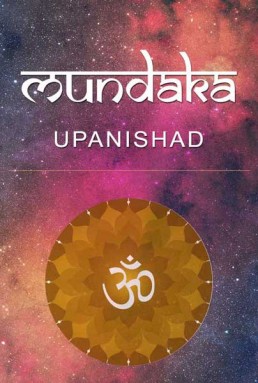शान्ता विद्वांसो भैक्ष्यचर्यां चरन्तः ।
सूर्यद्वारेण ते विरजाः प्रयान्ति
यत्रामृतः स पुरुषो ह्यव्ययात्मा ॥ ११॥
śāntā vidvāṃso bhaikṣyacaryāṃ carantaḥ .
sūryadvāreṇa te virajāḥ prayānti
yatrāmṛtaḥ sa puruṣo hyavyayātmā .. 11..
Mundaka Upanishad Introduction
Mundaka Upanishad Invocation
Mundaka 1 – Chapter 1 – Verse 1
Mundaka 1 – Chapter 1 – Verse 2
Mundaka 1 – Chapter 1 – Verse 3
Mundaka 1 – Chapter 1 – Verse 4
Mundaka 1 – Chapter 1 – Verse 5
Mundaka 1 – Chapter 1 – Verse 6
Mundaka 1 – Chapter 1 – Verse 7
Mundaka 1 – Chapter 1 – Verse 8
Mundaka 1 – Chapter 1 – Verse 9
Mundaka 1 – Chapter 2 – Verse 1
Mundaka 1 – Chapter 2 – Verse 2
Mundaka 1 – Chapter 2 – Verse 3
Mundaka 1 – Chapter 2 – Verse 4
Mundaka 1 – Chapter 2 – Verse 5
Mundaka 1 – Chapter 2 – Verse 6
Mundaka 1 – Chapter 2 – Verse 7
Mundaka 1 – Chapter 2 – Verse 8
Mundaka 1 – Chapter 2 – Verse 9
Mundaka 1 – Chapter 2 – Verse 10
Mundaka 1 – Chapter 2 – Verse 11
Mundaka 1 – Chapter 2 – Verse 12
Mundaka 1 – Chapter 2 – Verse 13
Mundaka 2 – Chapter 1 – Verse 1
Mundaka 2 – Chapter 1 – Verse 2
Mundaka 2 – Chapter 1 – Verse 3
Mundaka 2 – Chapter 1 – Verse 4
Mundaka 2 – Chapter 1 – Verse 5
Mundaka 2 – Chapter 1 – Verse 6
Mundaka 2 – Chapter 1 – Verse 7
Mundaka 2 – Chapter 1 – Verse 8
Mundaka 2 – Chapter 1 – Verse 9
Mundaka 2 – Chapter 2 – Verse 10
Mundaka 2 – Chapter 2 – Verse 1
Mundaka 2 – Chapter 2 – Verse 2
Mundaka 2 – Chapter 2 – Verse 3
Mundaka 2 – Chapter 2 – Verse 4
Mundaka 2 – Chapter 2 – Verse 5
Mundaka 2 – Chapter 2 – Verse 6
Mundaka 2 – Chapter 2 – Verse 7
Mundaka 2 – Chapter 2 – Verse 8
Mundaka 2 – Chapter 2 – Verse 9
Mundaka 2 – Chapter 2 – Verse 10
Mundaka 2 – Chapter 2 – Verse 11
Mundaka 3 – Chapter 1 – Verse 1
Mundaka 3 – Chapter 1 – Verse 2
Mundaka 3 – Chapter 1 – Verse 3
Mundaka 3 – Chapter 1 – Verse 4
Mundaka 3 – Chapter 1 – Verse 5
Mundaka 3 – Chapter 1 – Verse 6
Mundaka 3 – Chapter 1 – Verse 7
Mundaka 3 – Chapter 1 – Verse 8
Mundaka 3 – Chapter 1 – Verse 9
Mundaka 3 – Chapter 1 – Verse 10
Mundaka 3 – Chapter 2 – Verse 1
Mundaka 3 – Chapter 2 – Verse 2
Mundaka 3 – Chapter 2 – Verse 3
Mundaka 3 – Chapter 2 – Verse 4
Mundaka 3 – Chapter 2 – Verse 5
Mundaka 3 – Chapter 2 – Verse 6
Mundaka 3 – Chapter 2 – Verse 7
Mundaka 3 – Chapter 2 – Verse 8
Mundaka 3 – Chapter 2 – Verse 9
Mundaka 3 – Chapter 2 – Verse 10
Mundaka 3 – Chapter 2 – Verse 11
Mundaka 3 – Chapter 2 – Verse 12

Sri Shankara’s Commentary (Bhashya) translated by S. Sitarama Sastri
But those who possess the knowledge contrary to that of persons previously mentioned, i.e., the hermits of the forest and the Sanyasins. ‘Tapah,’ the karma enjoined on one’s order of life. ‘Sraddha,’ the worship of the Hiranyagarbha and other deities. ‘Upavasanti,’ follow: ‘Aranye,’ living in the forest. ‘Santah,’ having control over the group of senses. ‘Learned’ includes also house-holders who possess chiefly knowledge, living by begging; because, they have nothing to call their own. ‘Living on alms’ is connected with ‘living in the forest.’ ‘Through the orb of the sun,’ through the northern route indicated by the sun. ‘Virajah,’ their good and bad deeds being consumed. ‘Prayanti,’ go with excellence. ‘Where,’ to Satyaloka where the immortal Purusha, the first born, undecaying Hiranyagarbha is. ‘Undecaying,’ because he lives to the end of samsara. With this, end the movements within the pale of samsara attainable, through apara vidya. If it be said that some regard this as emancipation, we say it is not so, because of the Srutis, ‘All his desires are even here absorbed’ and ‘those intelligent persons whose mind is concentrated reach the all-pervading, on all sides and enter into everything, etc.,’ and because of the mention of emancipation being irrelevant in this context; for, in the course of treating of the apara vidya, there is no pertinency of emancipation being brought in. The consumption of karma spoken of is only relative; all the result of the apara vidya being in the nature of ends and means and diversified by the difference of acts, requisites and fruits and partaking of duality is only this much, which ends with reaching Hiranyagarbha. Accordingly also it has been said by Manu speaking of the various stages within samsara from the immovable upwards: ‘The wise consider this a high and pure stage to attain the world of Brahma, the Prajapatis (creators), virtue, mahat and avyakta.
Mundaka Upanishad – Verse 11 – Mundaka-1-2-11-tapaḥśraddhe – In Sanskrit with English Transliteration, Meaning and Commentary by Adi Shankaracharya (Sankara Bhashya) – Mundaka-1-2-11
